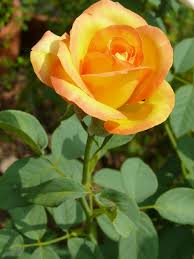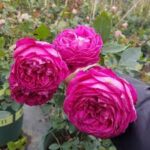
Rosa gallica, revered for centuries for its beauty and fragrance, has also found its place in modern medicine, where its therapeutic properties are increasingly recognized and studied. From its potential as a source of bioactive compounds to its applications in skincare, herbal remedies, and complementary medicine, Rosa gallica continues to inspire scientific inquiry and innovation in the field of modern healthcare. In this exploration, we delve into the research and diverse applications of Rosa gallica in contemporary medicine, shedding light on its role in promoting health and well-being.
#### Bioactive Compounds and Pharmacological Potential
1. **Phytochemical Composition:** Rosa gallica contains a wealth of bioactive compounds, including phenolic acids, flavonoids, tannins, and essential oils, which exhibit diverse pharmacological properties. These compounds have been studied for their antioxidant, anti-inflammatory, antimicrobial, and anticancer activities, among others.
2. **Antioxidant Effects:** Extracts from Rosa gallica have demonstrated potent antioxidant effects in preclinical studies, scavenging free radicals and reducing oxidative stress in cellular and animal models. These antioxidant properties may have implications for protecting against chronic diseases associated with oxidative damage, such as cardiovascular disease and neurodegenerative disorders.
3. **Anti-Inflammatory Activity:** Research suggests that Rosa gallica extracts possess anti-inflammatory properties, inhibiting pro-inflammatory mediators and pathways involved in the inflammatory response. These anti-inflammatory effects may be beneficial for conditions characterized by chronic inflammation, including arthritis, asthma, and inflammatory skin disorders.
#### Dermatological Applications
1. **Skin Health:** Rosa gallica has a long history of use in skincare and cosmetic products due to its soothing and moisturizing properties. Topical preparations containing Rosa gallica extracts are used to hydrate the skin, reduce redness and irritation, and promote a healthy complexion. These products are commonly used in moisturizers, toners, serums, and facial masks.
2. **Wound Healing:** The wound-healing properties of Rosa gallica have been investigated in both preclinical and clinical studies. Rosa gallica extracts have been shown to accelerate the healing process, enhance tissue regeneration, and reduce inflammation and scarring. These findings suggest potential applications for Rosa gallica in the treatment of wounds, burns, and other dermatological conditions.
#### Herbal Remedies and Traditional Medicine
1. **Traditional Uses:** In traditional medicine systems such as Ayurveda, Traditional Chinese Medicine (TCM), and Unani medicine, Rosa gallica has been used for its medicinal properties for centuries. In these systems, Rosa gallica is prescribed for a variety of conditions, including digestive disorders, menstrual irregularities, respiratory ailments, and emotional imbalances.
2. **Complementary Therapies:** In modern integrative and complementary medicine practices, Rosa gallica is used as a natural remedy for a range of health issues. Herbal preparations, including teas, tinctures, and capsules, are commonly used to promote relaxation, relieve stress, and support overall health and vitality.
#### Research Challenges and Future Directions
1. **Standardization and Quality Control:** One of the challenges in researching Rosa gallica is ensuring the consistency and quality of herbal extracts and preparations. Standardization of extraction methods, phytochemical analysis, and quality control measures are essential for ensuring reproducibility and reliability of research findings.
2. **Clinical Trials:** While preclinical studies have provided promising evidence of the therapeutic potential of Rosa gallica, further clinical trials are needed to evaluate its efficacy and safety in human populations. Rigorous clinical research is essential for establishing evidence-based guidelines for the use of Rosa gallica in medical practice.
#### Conclusion
Rosa gallica’s journey from ancient botanical remedy to modern medical marvel reflects the enduring legacy of this beloved flower in the realm of healthcare. As research continues to uncover the therapeutic potential of Rosa gallica, its applications in modern medicine are poised to expand, offering new hope and possibilities for promoting health and well-being. By harnessing the healing power of Rosa gallica, we honor the wisdom of traditional medicine while embracing the advancements of contemporary science in the quest for optimal health and vitality.
### Rosa Gallica in Modern Medicine: Research and Applications (Part 2)
Continuing our exploration of Rosa gallica’s role in modern healthcare, we delve deeper into the ongoing research and diverse applications of this remarkable botanical in addressing contemporary health challenges. From its potential in chronic disease management to its emerging role in integrative medicine, Rosa gallica continues to inspire scientific inquiry and innovation, offering new avenues for improving patient outcomes and quality of life.
#### Chronic Disease Management
1. **Cardiovascular Health:** Emerging research suggests that Rosa gallica may offer benefits for cardiovascular health. Studies have shown that its antioxidant and anti-inflammatory properties may help protect against oxidative stress, reduce cholesterol levels, and improve endothelial function, thus potentially lowering the risk of cardiovascular diseases such as atherosclerosis and hypertension.
2. **Metabolic Disorders:** Rosa gallica extracts have been investigated for their potential in managing metabolic disorders such as diabetes and obesity. Preclinical studies have demonstrated antidiabetic effects, including improved glucose tolerance and insulin sensitivity, as well as anti-obesity effects, such as reduced adiposity and improved lipid metabolism. Further research is needed to elucidate the mechanisms underlying these effects and evaluate their clinical relevance.
#### Neurological and Mental Health
1. **Cognitive Function:** Some studies suggest that Rosa gallica may have neuroprotective effects and potential benefits for cognitive function. Its antioxidant and anti-inflammatory properties may help protect against neurodegenerative diseases such as Alzheimer’s and Parkinson’s disease by reducing oxidative stress and inflammation in the brain. Clinical trials are underway to investigate its efficacy as a therapeutic agent for cognitive impairment and dementia.
2. **Stress Reduction:** Rosa gallica is traditionally used as a calming and mood-enhancing herb in herbal medicine practices. Its aromatic compounds, including essential oils, are believed to have a soothing effect on the nervous system, promoting relaxation and reducing stress and anxiety. Research into the anxiolytic and antidepressant effects of Rosa gallica is ongoing, with promising preliminary results.
#### Integrative Medicine Approaches
1. **Herbal Formulations:** Rosa gallica is commonly incorporated into herbal formulations and traditional remedies in integrative medicine approaches. These formulations may combine Rosa gallica with other botanicals and natural ingredients to create synergistic effects and enhance therapeutic outcomes. Herbalists and holistic healthcare practitioners often tailor formulations to individual patient needs, taking into account factors such as constitution, lifestyle, and health goals.
2. **Nutraceuticals and Supplements:** Rosa gallica extracts are also available in the form of nutraceuticals and dietary supplements, marketed for their health-promoting properties. These products may be standardized extracts or whole plant preparations, offered in various forms such as capsules, tablets, and powders. Consumers interested in incorporating Rosa gallica supplements into their wellness routine should seek products from reputable manufacturers with transparent labeling and quality assurance.
#### Future Directions and Challenges
1. **Biomedical Research:** The field of biomedical research continues to uncover the complex mechanisms of action and therapeutic potential of Rosa gallica. Advances in pharmacology, genomics, and metabolomics are shedding new light on the molecular basis of its bioactivity and guiding the development of novel therapeutic strategies.
2. **Regulatory Considerations:** Regulatory frameworks governing the use of botanicals and herbal remedies vary by region and country. Standardization of botanical extracts, quality control measures, and safety assessments are essential considerations in ensuring the efficacy and safety of Rosa gallica products for consumer use.
#### Conclusion
Rosa gallica’s journey from ancient herbal remedy to modern medical marvel underscores its enduring relevance and therapeutic potential in the ever-evolving landscape of healthcare. As research advances and our understanding of its bioactivity deepens, Rosa gallica holds promise for addressing a wide range of health conditions and promoting holistic well-being. By embracing the synergies between traditional wisdom and modern science, we unlock the full therapeutic potential of Rosa gallica, ushering in a new era of integrative and personalized medicine for the benefit of all.










